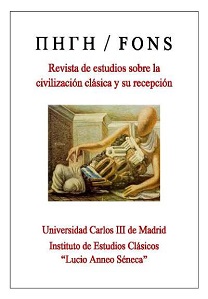Xenophon's Oeconomicus
Ischomachus' Management of Slaves
Abstract
In the Oeconomicus the management of slaves presents some very interesting aspects: on the one hand widespread practices, like purchase, sale, leasing and manumission of slaves, are completely ignored; on the other we can find some probably innovative practices as the prevailing tendency to a rewarding system based on merit and especially the attribution of command functions to some slaves, the epitropoi. Even more innovative the fact that it is acknowledged that at least some slaves, who hold offices of responsibility (the epitropoi and the housekeeper), are endowed with enkrateia, which is the foundation of virtue according to Xenophon’s Socrates. This seems to some extent to anticipate a view destined to a decisive development in Hellenistic age, according to which virtue is accessible also to slaves.
Downloads
References
Bevilacqua, F. (ed.) (2010), Memorabili di Senofonte , Torino.
Bevilacqua, F. (2015), «L’Economico di Senofonte: un testo problematico, una ipotesi di lavoro», Magazzino di filosofia 25, 99-132.
Bevilacqua, F. (2018a), «Socrates’ Attitude towards Politics in Xenophon and Plato», in G. Danzig, D. Johnson, D. Morrison (eds.), Plato and Xenophon. Comparative Studies, Leiden, 461-486.
Bevilacqua, F. (2018b), «Kalokagathia e kaloi kagathoi nelle opere socratiche di Senofonte (Memorabili, Economico, Simposio )», Magazzino di filosofia 32, 5-99.
Bevilacqua, F. (2023) «Xenophon’s Oeconomicus : Elements of New Ethics in Economics», in C. Mársico, D. Rossi Nunes Lopes (eds.), Xenophon, the Philosopher, Berlin, 113-129.
Bourriot, F. (1995), Kalos kagathos-Kalokagathia. D’un terme de propagande de sophistes à une notion sociale et philosophique , I-II, Hildesheim-Zürich-New York.
Chantraine, P. (ed.) (1949), Xénophon, Économique, Paris.
Delebecque, É. (1957), Essai sur la vie de Xénophon, Paris.
De Martinis, L. (ed.) (2013), Senofonte, Tutti gli scritti socratici, Milano.
Foucault, M. (1984), L’usage des plaisirs, Paris.
Natali, C. (ed.) (1988), Senofonte, L’amministrazione della casa (Economico), Venezia.
Pomeroy, S. (ed.) (1994), Xenophon, Oeconomicus. A Social and Historical Commentary, Oxford.
Roscalla, F. (ed.) (1991), Senofonte, Economico, Milano.
Stevens, J.A. (1994), «Friendship and Profit in Xenophon’s Oeconomicus», in P.A. Vander Waerdt (ed.), The Socratic Movement, Ithaca-London, 209-237.
Strauss, L. (1970), Xenophon’s Socratic Discourse, with a new, literal translation of the Oeconomicus by C. Lord, Ithaca-London.
Valente, M. (ed.) (2011), [Aristotele], Economici, Alessandria.
Wankel, H. (1961), Kalos kai Agathos, diss, Würzburg.
Se permite que los autores de los artículos y de las discusiones publicados en la revista los reproduzcan en otros sitios siempre y cuando se haga mención de que han sido previamente publicados en ΠΗΓΗ/FONS.




